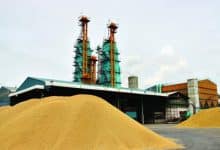Thailand urged to diversify agricultural exports to boost value

A study by the Commerce Ministry urges agricultural businesses to widen their export markets to mitigate risk and boost the value of food products and processing. The advice follows findings that the majority of export-oriented agricultural goods are commodities or those with only rudimentary processing.
Deputy Commerce Minister Napintorn Srisunpang disclosed that agricultural and agro-industrial products accounted for 17.3% of the total exports of US$285 billion in 2023. The top five highest-value agricultural exports were fruits (25.9%), rice (19.2%), chicken (15.2%), cassava (13.8%), and rubber (13.6%), which collectively constituted 87.7% of all agricultural exports. Fresh chicken eggs, rice, fruits, meat and parts of consumable animal meat, and breeding shrimps showed the highest export value growth.
The leading export markets for agricultural products were China (42%), Japan (12%), the US (5.6%), Malaysia (4.4%), and Indonesia (3.5%), which together made up 67.5% of the total agricultural exports. The UK led the export value growth markets, followed by the Philippines, South Africa, Laos, and Singapore.
Napintorn emphasised the need for Thailand to export higher-value agricultural goods and increase agro-industrial products such as future food, processed organic agricultural products, and extracts from agricultural production. He stated that Thailand’s heavy reliance on a few items and markets for exports needs diversification to reduce risks.
The five highest-value agro-industrial exports were canned and processed seafood, refined sugar, animal feed, wheat flour and other processed foods, and beverages, which together constituted 61.9% of total agro-industrial exports. The highest export value growth was seen in cocoa and condiments, canned and processed vegetables, refined sugar, ice cream, and seasonings.
The leading export markets for agro-industrial products were the US (12.8%), China (9.1%), Japan (7.6%), Cambodia (6.5%), and Indonesia (6.2%), which represented 42.2% of the total export value of agro-industrial products, reported Bangkok Post.
Napintorn highlighted the importance of agricultural and agro-industrial exports for income generation and distribution to farmers, who make up 46% of the population. He stressed the need for collaboration across all relevant sectors to support the sustainable growth of the agricultural sector, using research and technology to increase productivity and reduce costs.
Napintorn also called for the restructuring of agricultural exports, higher value agricultural exports, product diversification for export, and exploration of new export markets while maintaining existing ones. He stressed the need to enhance product quality and standards, adhere to new trade regulations, and implement environmentally friendly practices.
Latest Thailand News
Follow The Thaiger on Google News:


























